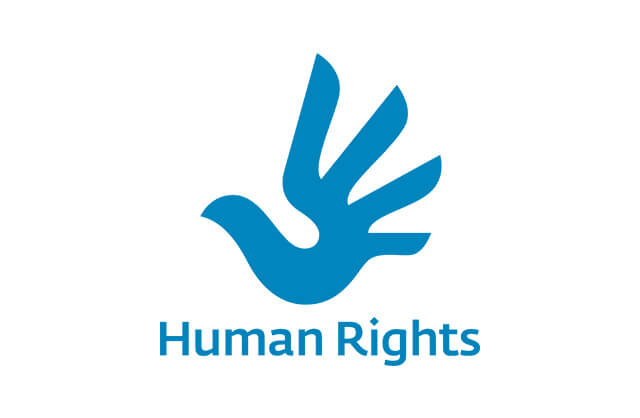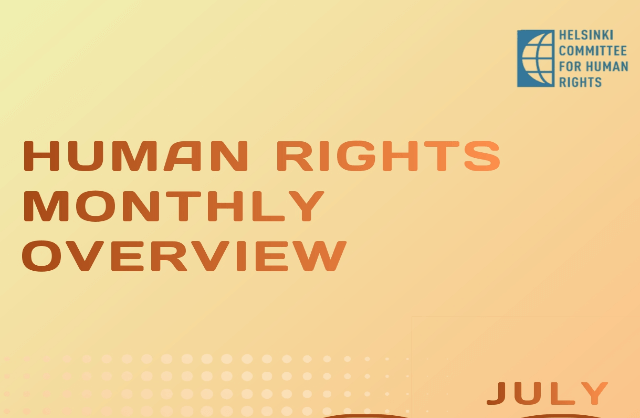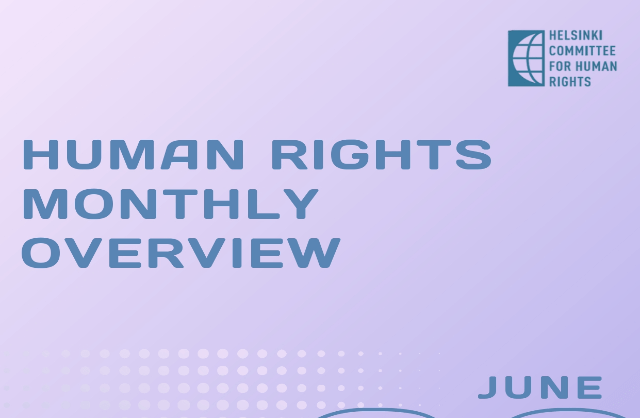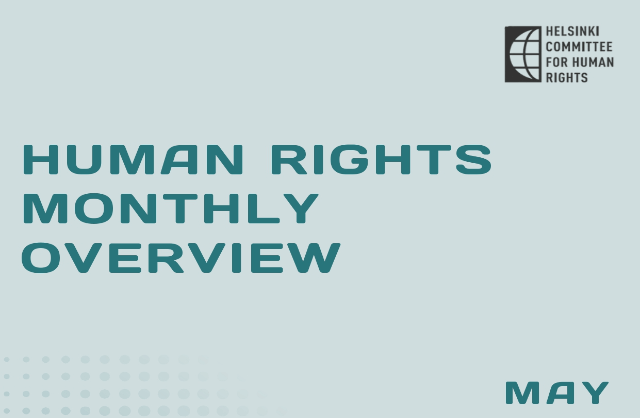Monthly report on Human Rights – February, 2017
March 16, 2017

The monthly report on the human rights situation in the Republic of Macedonia for July 2017 covers topics from the following areas: Special public prosecutor`s office, Discrimination, Hate crimes and Social protection.
SPECIAL PUBLIC PROSECUTOR’S OFFICE
PROSECUTORS FROM SPO SANCTIONED FOR CONTEMPT OF COURT
Judge Tatjana Mihajlova adjourned the last hearing on ordering and committing violence in the Municipality of Centar after prosecutors from the Special Public Prosecutor’s Office, Katica Janeva and Fatime Fetai, were fined 2,000 euros for “contempt of court”. The first fine of 1,000 euros was imposed on Prosecutor Fetai after she accused Judge Mihajlova of intellectual forgery of minutes at the previous hearing and stated that she would initiate criminal proceedings against her. Janeva was sanctioned with the same fine after pointing out that the judge did not deserve the title of Acting President of the Court and that she was incapable of taking the minutes. After that, the two prosecutors accused the judge of intellectual forgery, yet once again, and they were fined with additional 1,000 euros each.
This is the first case in the history of the Primary Court Skopje 1 ‒ Skopje where a judge sanctions a public prosecutor for contempt of court, which sets a precedent. SPO announced that they appealed Judge Mihajlova’s decision before the Appellate Court. The Court published an announcement stating that in the 72-year history of the institution, they have never witnessed such an insult to a judge, to the court, and the state judiciary in general. The Court condemned the prosecutors’ behavior as arrogant and extremely unprofessional and stated that Janeva and Fetai had abused the right to freedom of speech and violated every principle of the Code of Ethics and Professional Conduct for Prosecutors. The announcement stated that the trial judge (Mihajlova) calmly and with dignity, as befits a judge, took record of every insult aimed directly at her and at the court, for which she warned the prosecutors several times to refrain from insults and to act within the framework of professional ethics.
The monitoring of SPO’s work in February showed that they continuously face obstacles in their work from the point of difficult cooperation, primarily with the Primary Court Skopje 1, as well as with other institutions. Extremely worrying are the recent allocations of judges in the Court, whereby few judges who approved the search warrants and the detention measures requested by SPO, were allocated to lower positions or other departments.
Equally alarming are the sanctions imposed on prosecutors Fetai and Janeva for contempt of court, which set a precedent in the Court’s 72-year operation. A prosecutor has never been sanctioned by a trial judge before. All of this brings into question the independence and impartiality of the Court’s work.
RECOMMENDATION:
The recommendations are similar to the ones already given. Judicial institutions, especially Primary Court Skopje 1, have to openly cooperate with the SPO and to realize the invaluable importance of the prosecution’s function (and therefore of the Court) in restoring the rule of law in the country. EU’s latest progress report on the country noted that Macedonia is a “captive state”, an unprecedented characterization for a candidate state, and this mostly refers to the captivity of the judicial institutions.
DISCRIMINATION
Discrimination on grounds of sex and gender, heath condition, disability and religion in the 8th grade “Civic education” textbook
With decision no. 10-1602 / 1 of 19.06.2009, the Minister of Education and Science approved the use the “Civic Education” textbook for 8th grade, whose authors are Ksenofon Ugrinovski and Krste Vasilevski. The Ministry of Education and Science published the textbook, while the review committee represented by Vlado Petrovski, Biljana Sinadinovska Sotarovska and Tatjana Georgievska issued a positive review of the textbook, which contains a violation of the right to education through discriminatory content based on sex and gender, health condition, disability and religion.
On pages 34 and 35, the textbook teaches about women’s rights and, among other things, it is said that “only respected women and healthy mothers can provide healthy families, and the further development of society depends on them”. Such a claim is discrimination on the basis of a health condition, physical and intellectual disability towards all women with physical and intellectual disability, chronic health conditions or any kind of health problems since they are not “healthy” according to the authors’ definition. On the other hand, this definition is extremely discriminatory towards women who do not have or cannot have children because they are not mothers, and according to the textbook authors, they are excluded and cannot contribute to the process of “further development of society”. Another concerning issue is the authors’ claim that this statement can be found in the Convention on the Elimination of Discrimination against Women (CEDAW), which is absolutely incorrect and constitutes misinterpretation of the Convention.
In the content of the same lesson, there are two illustrations, the first of which illustrates a woman in an apron who is simultaneously cooking and standing in front of the computer, and in the other one, a woman is sitting with crossed legs and a magazine in her hand while a man is vacuuming the room. The following question is given under the illustrations: “Which one of these women has gained her rights?” This is an illogical question since neither of the two illustrations shows the way in which the women have fought for and gained their rights.
Further in the same lesson, the authors review women’s roles in the time of Adam and Eve who lived in paradise, which represents favoritism towards the Christian religion as opposed to all other religions existing in the Republic of Macedonia. This content is discriminatory on the basis of religion and religious convictions of women who are of different religion or those who are not religious. Trying to explain women’s rights through religion, the authors state that “it is believed that the woman committed the first sin in heaven. She tasted the forbidden fruit, tempted Adam and she has been suffering ever since. In the “Genesis” by Moses, God says to the woman: “I will increase your suffering when you will be pregnant, you will suffer pain while you give birth to children, you will be under the authority of your husband and he will be your master”. The attempt to explain women’s rights through religion, supported by a quote in which a woman’s obedience to her husband is obligatory, apart from representing discrimination on the basis of religion and religious convictions, it also promotes discrimination towards women and gender prejudice.
RECOMMENDATION:
We urge competent institutions, such as the such as the State Education Inspectorate, the Bureau for Development of Education, the Ministry of Education and Science, the Ombudsman and the Commission for Protection against Discrimination, to take appropriate actions within their jurisdiction as to remove such content and replace it with an appropriate one that will fulfill the goals of education and will respect the laws of the Republic of Macedonia.
SEGREGATION OF ROMA STUDENTS IN SECONDARY SCHOOL
The Helsinki Committee has received several reports of alleged segregation of Roma students at the “Arseni Jovkov” High School in Skopje. Namely, representatives of the IRIZ citizens’ association addressed the Committee, presenting the problem that Roma students have been facing at the school for years, that is, their segregation in special classes separated from Macedonian students. For these reasons, the two associations filed a complaint with the Ombudsman’s Office requesting answers to several questions. The questions referred to the way in which the classes are formed, the records of the total number of students of Roma ethnicity, whether there are classes consisted only by Roma students, and if there is a possibility to transfer students from one to another class.
Among other things, after holding a meeting with several students from the named school, the Helsinki Committee and the IRIZ association, new information has emerged that in recent years, some of the students have been transferred to the newly opened “Sail Jusuf” secondary school in Shuto Orizari Municipality. This represents a step further into total segregation of these students and contributes to the increase of differences between the ethnic communities and decrease of quality in education for Roma students. It was also one of the issues in the complaint submitted to the Ombudsman’s office.
Acting upon the filed complaint for examination of the allegations and for determining the situation, representatives from the Ombudsman’s Office visited the “Arseni Jovkov” Secondary School and the “Sail Jusuf” Secondary School. During the visit, the Ombudsman found that there is no specific rule for forming classes in the “Arseni Jovkov” school and that the students are divided according to their requirements and needs. It is an undeniable fact that, over the years, the number of students from Roma ethnic community has decreased, which is due to their enrollment in the newly opened “Saip Jusuf” school. The Ombudsman’s visit did not reveal the existence of segregation because there were Roma students in some classes, although their number was not confirmed. According to our information, there are one or two Roma students in some of the classes, and part of the classes consist exclusively of Roma students. On the other hand, the Ombudsman stated that after the opening of the “Saip Yusuf” school, it is undisputed that Roma students enroll there, which in the long run, can negatively affect their integration in a multicultural society. In the Ombudsman’s opinion, this practice could lead to hidden forms of segregation and discrimination of members of particular communities.
RECOMMENDATION:
The Helsinki Committee recommends that the Ministry of Education and Science and other competent institutions in the field of education take appropriate measures and activities to indicate the possible problem with the outflow, i.e. enrollment of Roma students in only one school. It is quite concerning that this school does not have a specialized program for one area, but provides education for many professions, that is, for hairdressers, construction workers, economists, and waiters. That fact brings into question the quality of education that is obtained in this secondary school. It is necessary to reexamine the decision for the existence of such a school and to conduct activities for students and their parents in primary education in order to raise the level and awareness of inter-ethnic integration and its advantages in education. According to the Ombudsman’s, the implementation of such measures should be conducted by following the Strategic Plan of the Ministry of Education and Science 2016-2018 and the National Strategy on Non-Discrimination and Equality 2016-2020 in the area of education, science, sport, and culture.
HATE CRIMES
THE POLITICAL CRISIS GENERATES HATE CRIMES
On the www.zlostorstvaodomraza.mk web page, the Helsinki Committee has been registering hate crimes since 2013, i.e. incidents motivated by intolerance or prejudice against members of a particular group in the society. An increase in the number of such incidents is particularly noticeable before and during elections. During the election campaign for the early parliamentary elections in 2016, we have registered 25 crimes committed due to the victims’ political affiliation.
Unlike in previous years, this type of hate crimes in 2017 continued after the end of the early parliamentary elections. Although the incident rate decreased shortly after the elections and during the second half of December 2016 and only one incident was registered in January 2017, hate crimes intensified after the political party VMRO-DPMNE failed to secure the majority of MPs for forming a government.
During February, 17 hate crimes were registered, 14 of which happened in Skopje, 2 in Prilep and 1 in Bitola. Due to different ethnicity, a dozen of young people was attacked and injured, and 8 party headquarters of the political party SDSM were stoned. The incidents involving attacks on young people occurred in the center of Skopje (Makedonija Street, Transporten Centar, NBRM, City Stadium) and bus stops for JSP busses transiting through municipalities inhabited by members of the Macedonian and the Albanian ethnic community. The incidents involved stoning a bus, group fights, and serious attacks with cold weapons. SDSM party headquarters were stoned in Skopje, Prilep and Bitola. The stoning happened mostly at night, i.e. after midnight.
One of the incidents which occurred due to the difference in ethnicity and religion happened on February 23rd at Makedonia Square in Skopje, when a group of male persons physically and verbally attacked a young girl, a student at the “Justinian I” Faculty of Law. She was wearing a headscarf and the attackers tried to take it off her head, calling her “a terrorist”, “a disgusting shiptar”, telling her to “go back to Arabia”. At the location of the incident, several citizens warned the attackers to step away, after which the attackers fled.[1] On February 28th, two groups of males started a fight near Narodna Banka in Skopje and two young people at the age of 17 and 19 were injured thereby. There are serious suspicions that the incident was committed by members of the Albanian community as retaliation for the physical and verbal assault on the Albanian student at Makedonija Square.[2]
RECOMMENDATION:
The Helsinki Committee recommends following the positive example of immediate removal of hate speech graffiti that would contribute to the reduction of negative consequences, especially when it comes to sensitive environments such as primary schools. The obligation for removal which is the state institutions’ obligation must be fulfilled in every single case.
SOCIAL PROTECTION
INABILITY TO EXERCISE THE RIGHT TO FAMILY PENSION OF A DISABLED PERSON
The Helsinki Committee was addressed by the person with initials P.Z. who requested legal aid. Namely, this case involves a person with cerebral palsy who has submitted a request to the Pension and Disability Insurance Fund for inheriting the family pension from his mother who died in 2011. The family pension was inherited by his father, not knowing about the possibility that his son could be the beneficiary. After realizing that was a possibility, the father on behalf of the P.Z. filed a request with the Pension and Disability Insurance Fund to transfer his pension to his son, P.Z., with the aim of protecting his son and receiving income because was not able to work. The request was denied by the Pension and Disability Insurance Fund, with the explanation that the Commission for Assessment of the Working Ability considers that the person is capable of independent living. Dissatisfied with this decision, P.Z. filed an appeal to the State Second Instance Commission Deciding on Administrative procedure and Labor Relations, and the appeal was denied as well. Against this decision of the Second Instance Commission, P.Z. initiated an administrative dispute by filing a lawsuit with the Administrative Court. The Administrative Court, deciding upon the complaint, annulled the Second Instance Commission’s decision and returned the case for reconsideration of a decision. Deciding on the returned case, the Second Instance commission upheld the appeal of P.Z. and annulled the decision of the First Instance body by returning the case for reconsideration. The Fund for Pension and Disability Insurance, having decided on this case, yet again adopted the same decision by which the person P.Z. is denied the right to a family pension, with the same explanation that he is capable of independent living. P.Z. appealed this decision as well, and the second instance authority upheld the appeal, annulled the decision and returned the case for a reconsideration. However, for the third time, the Pension and Disability Insurance Fund did not deviate from its opinion and adopted the same decision by which the request was rejected. The client appealed the decision for the fourth time and is now expecting a decision from the second instance body.
In this particular case, the entire procedure is extremely long, and the person is forced to appear for assessment before the Commission for Assessment of the Working Ability every few months. It is unclear why the Commission, in this case, considers that a person is capable of independent living despite the fact that the person has a lifelong diagnosis of cerebral palsy that is supported and proven by several specialist doctors who claim that the person suffers from severe physical development disability. In this way, the person is denied the right to use a family pension, which is stipulated and regulated by the mentioned law.
The right to a family pension in the Republic of Macedonia is regulated by the Law on Pension and Disability Insurance. This law stipulates that a child acquires, i.e. uses the right to a survivor’s pension, if before the death of the insured person, i.e. the beneficiary of the pension he/she was supported by, was incapable of work or such incapacity occurred within one year from the day of death of the insured person, i.e. the beneficiary. Additionally, this law provides that if during the exercise of the right to a family pension, the child becomes incapable of work, he/she permanently reserves the right to a family pension and that the disabled child has the right to a family pension after the termination of his/her employment. However, practice shows that the provisions of this law are not implemented, i.e. their implementation is rather selective.
RECOMMENDATION:
The Helsinki Committee urges competent institution for deciding on requests for exercising the rights to a family pension ‒ the Pension and Disability Insurance Fund ‒ to act in accordance with the law and guidelines of the higher authorities when deciding on family pension beneficiary rights. This is especially important in cases of persons with permanent disability and incapacity for work and independent living which represent a vulnerable category.
INABILITY TO EXERCISE THE RIGHT TO FAMILY PENSION DUE TO MISREPRESENTED FACT SITUATION
The Helsinki Committee for Human Rights was addressed by a client who was prevented from exercising the right to a family pension due to misrepresentation of fact situation and the use of a material right by the Pension and Disability Insurance Fund of Macedonia.
Namely, the case is about a 16-year old person who had been diagnosed with a disability from the first category from an early childhood and thus is completely and permanently unable to live independently, with a decision of 1968 adopted by the Communal Institution for Social Security Bitola. With this decision, the client is denied the right to professional rehabilitation, which deems him/her unable to work and live independently as a result of the disability of the first category.
After the death of the client’s parent, who was a beneficiary of a family pension, a request was submitted for a family pension based on incapacity for independent living and work in accordance with the decision of the Communal Institution for Social Insurance Bitola of 1968. For the purpose of conducting a procedure, the client was required for assessment before the Commission, even though the invalidity was already established. In the procedure, the records of the decision of the Communal Institution for Social Security Bitola were requested for submission, and it was found that they do not exist in the archive of the Pension and Disability Insurance Fund – Bitola as a legal successor of the Communal Institution, although in accordance with the regulations for storage of records, they should have been kept for 50 years.
As a result of the institution’s oversight, the Commission for Assessment of Working Ability, as well as the Commission for Revision of Findings, Assessment and Opinion on Disability, i.e. incapacity for work, decided that the 63-year-old client is capable of working. Upon making such a decision, the rights and interests of the party in the procedure are not completely disregarded, given the fact that the client is expected to establish labor relations for the first time at the age of 63 ‒ an age at which, if he/she had been rehabilitated and, consequently, able to work and live independently, would have already been eligible for an old-age security pension.
RECOMMENDATION:
The work and the decision-making of state institutions are regulated by the Law on General Administrative Procedure, and institutions are obliged to act accordingly. When acting, the fact situation of cases must be determined, and for this purpose, all facts that are important for the adoption of a lawful and correct decision must be properly reviewed and established. When conducting the procedures and deciding on specific cases, the state administration bodies are obliged to enable the parties to protect and exercise their rights in the simplest way possible.


